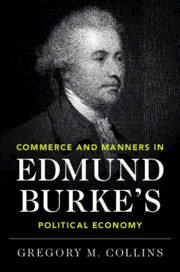Book contents
- Commerce and Manners in Edmund Burke’s Political Economy
- Commerce and Manners in Edmund Burke’s Political Economy
- Copyright page
- Dedication
- Contents
- Figures
- Tables
- Acknowledgments
- Introduction
- Part I Biography
- Part II Market Economies
- Part III The British Constitution and Economical Reform
- Part IV Foreign Trade
- Part V India
- Part VI The French Revolution
- Conclusion
- Bibliography
- Index
Introduction
Published online by Cambridge University Press: 24 April 2020
- Commerce and Manners in Edmund Burke’s Political Economy
- Commerce and Manners in Edmund Burke’s Political Economy
- Copyright page
- Dedication
- Contents
- Figures
- Tables
- Acknowledgments
- Introduction
- Part I Biography
- Part II Market Economies
- Part III The British Constitution and Economical Reform
- Part IV Foreign Trade
- Part V India
- Part VI The French Revolution
- Conclusion
- Bibliography
- Index
Summary
The Introduction begins by presenting the problem of Burke’s conception of political economy: while Burke is known as the most celebrated critic of the abstract theory of the French Revolution, his defense of economic freedom rested in many ways on principles some French revolutionaries also endorsed, such as individual liberty, the right to property, a free grain trade. Framed differently, although Burke has acquired a powerful reputation for defending tradition, he also championed a human activity, market exchange, which was perceived by contemporaries as a disruptive force to settled social conventions. Therefore, was there an ineradicable tension in Burke’s thought between his praise of tradition and his embrace of commercial dynamism? Did he fully champion Adam Smith’s system of natural liberty? Did Burke offer a convincing way to overcome the “Burke-Smith” problem?, or “Das Edmund Burke Problem,” that of reconciling political stability with economic change? Answering these questions, I argue, can help us comprehend Burke’s own beliefs about the relation between political economy and ethics, and offer timely lessons on the compatibility between liberty and virtue in modernity.
Keywords
- Type
- Chapter
- Information
- Publisher: Cambridge University PressPrint publication year: 2020

